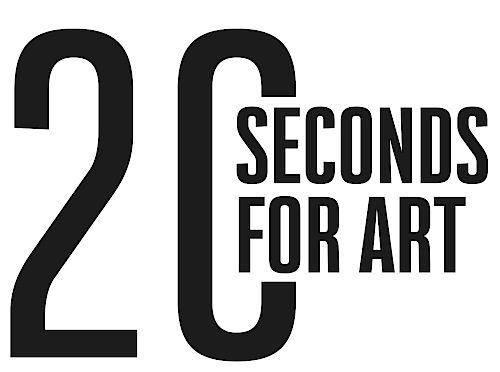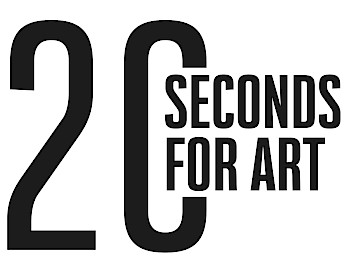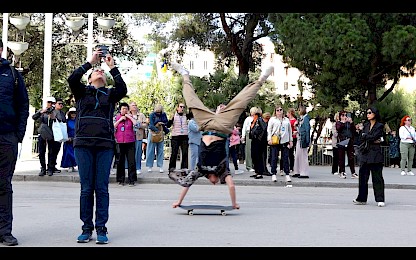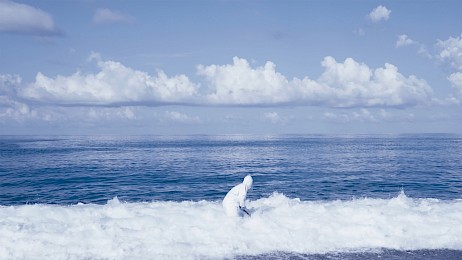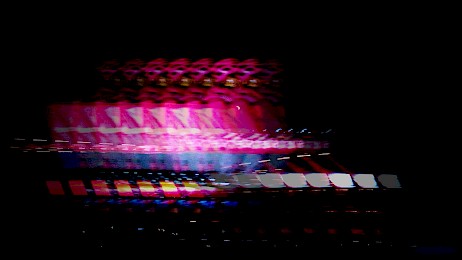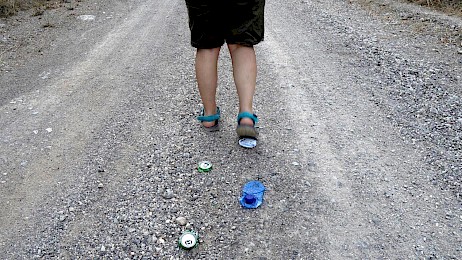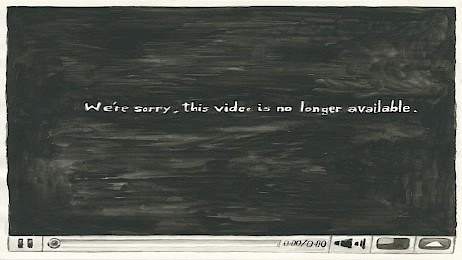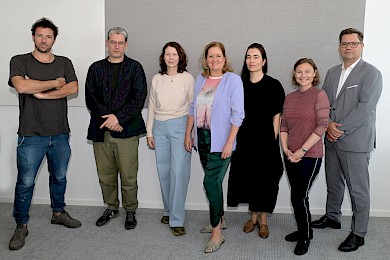The winners of the short film competition "20 Seconds for Art" have been selected. The open competition, which has been organized in cooperation with INFOSCREEN since 2013, took place for the sixth time this year. A jury selected five films from 164 submissions, which will be shown alternately on INFOSCREEN screens every seven minutes in subway stations, streetcars and buses in Austria thorughout this summer.
Each time, the competition is dedicated to a current topic relating to public space. This time it was "Community 3.0. Public Space in the Digital Age". Public space is a communal space, a place of constant negotiation in which different social ideas and needs clash and in which the boundaries between private and public spheres of life become blurred. These processes have long since spilled over into the digital, virtual space and from there are reflected back onto the materially tangible living space. So today we have to ask ourselves what opportunities, limits and risks digitalization holds for the public sphere and what changes it brings about. What can and could digital technologies contribute to the common good in the public sphere and what responsibility is associated with this? How do they influence social interaction and togetherness and possible participation now and in the future?
The competition was aimed at artists, students and graduates of art, graphic design, film, architecture and urban planning courses or people working in the arts nationally and internationally (aged 18 and over). Participants were invited to submit soundless 20-second short films on this topic and the issues it raises for them.
Nigel Gavus and Fred Plocque Santos, "The digital eclipse of the ego"
The protagonist of the film rides for 20 seconds - doing a handstand on his skateboard - in the public space of Barcelona through a crowd of people who are so engrossed in their cell phones that they no longer perceive the real world. Nigel Gavus and Fred Plocque Santos want to encourage people to sharpen their own perception and appreciate public space as a place of encounter again.
Jury statement: In the form of an excerpt-like snapshot, the film deals with the fact that attention is becoming a scarce resource in the digital age. Even spectacular and unconventional actions have to compete with swiping, selfies and social media and are therefore barely noticed. “Fear of missing out” aspects are addressed, as is the obsession with mobile devices.
Luca Granato, "Das Meer pflügen"
A person in a protective suit stands in the sea and plows it with a hoe - an almost endless and impossible task. Luca Granato deals with the challenges of an age of ultra-digitalization. He explores the relationship between the individual and their environment as well as the possibilities of interpersonal relationships in an increasingly networked world.
Jury statement: The film illustrates the challenges and powerlessness of the individual in the face of the daily flood of information. Powerful images create the metaphor of a liquid, fluid digital culture. The protagonist's attempt to “pin something down” in a liquid aggregate state resembles a Sisyphean task. The work raises many questions and allows the viewer to answer them individually.
Alexander Klapsch, Moritz Kühn and Sophie Schwarz, "Neon Traces"
Bicycle couriers leave luminous traces in the cityscape at night as they pass by with their reflective bags and brightly colored jackets. The film "Neon Traces" draws attention to the workers who are largely unnoticed and yet omnipresent in the "smart city" and thus highlights an invisible part of digitalization as a consequence of a new economic practice and its effects on public space.
Jury statement: The film addresses the topic by visualizing digital structures in public space. Despite the film's high degree of abstraction, the viewer can recognize the drivers of different delivery services on closer inspection. It thus encourages reflection on precarious working conditions in the platform economy and changes in the urban cityscape due to invisible digital structures.
Anna Vasof, “Footprints”
A person walks along a path and leaves behind waste with every footprint. Anna Vasof uses a simple metaphor to illustrate the complex problem of our digital footprints. The influence of people on the environment is depicted in a laconic way, as they unconsciously produce and carelessly leave behind waste through their participation in digital life.
Jury statement: The film conveys a clear message and visualizes the topic of the individual, ecological footprint. Footprints are left behind unconsciously every day. Digitalization and the associated consumption of resources are often neglected when it comes to environmental pollution, as they are invisible waste. However, they force an imprint. The film uses striking imagery to criticize consumerism and addresses the ecological damage caused by a Western lifestyle.
Dario Wokurka, “Who's sorry?”
Everyone has probably read "We're sorry, this video is no longer available" on the internet at some point. Dario Wokurka writes this apology in a drawn cartoon aesthetic on a black, hand-colored background. That's all that happens. According to Wokurka, community in the digital space is increasingly dependent on non-public companies; content can disappear due to algorithms, private or political interests.
Jury statement: On a formal level, the film shows a play between the digital and analog worlds. A subject known exclusively from the digital world is translated into analog form, only to reappear on a digital medium. In terms of content, complex topics such as censorship and the availability and archiving of digital content are addressed. The film raises questions about information control and control mechanisms accomplished in a very reduced and effective way.
Location
around 4.000 INFOSCREENs all over Austria
Gallery
Further Information
Nigel Gavus * 1992 in Graz (AT), lives in Vienna
nigelgavus.com / instagram.com/dormibundo/
Fred Plocque Santos * 1989 in Bordeaux (FR), lives in Barcelona (ES)
instagram.com/yeahleyeah/
Luca Granato * 1999 in Cosenza (IT), lives in Southern Italy
lucagranato.it
Alexander Klapsch * 1996 in Leibnitz (AT), lives in Vienna
instagram.com/kla_alexander/
Moritz Kühn * 1996 in Regensburg (DE), lives in Vienna (AT)
instagram.com/_moritz_kuehn/
Sophie Schwarz * 1996 in Ingolstadt (DE), lives in Vienna (AT)
studiomaplus.com
Anna Vasof is a Media and Time artist
annavasof.net
Dario Wokurka * 1988 in Vienna (AT), lives in Vienna
dariowokurka.com / instagram.com/dw_1027/
JURY
Marcello Demner, Managing Director, Demner, Merlicek & Bergmann/DMB
Cornelia Offergeld, Curatorial Director KÖR Kunst im öffentlichen Raum Wien
Stefanie Paffendorf, INFOSCREEN Director Editorial Department
Eva Sangiorgi, Director VIENNALE. Vienna International Filmfestival
Axel Stockburger, Artist and Professor at the Academy of Fine Arts Vienna
Five award-winning short films 20 Seconds for Art, 2024Nigel Gavus, Fred Plocque Santos, Luca Granato, Alexander Klapsch, Moritz Kühn, Sophie Schwarz, Anna Vasof, Dario Wokurka
Time Period
July 8 until September 1, 2024
Education - Events
Press
Links
Cooperation partner/s

